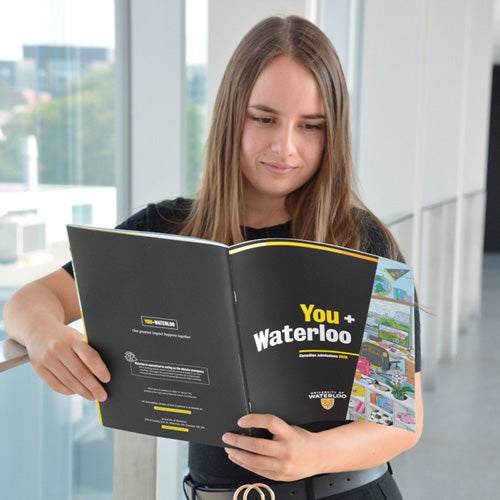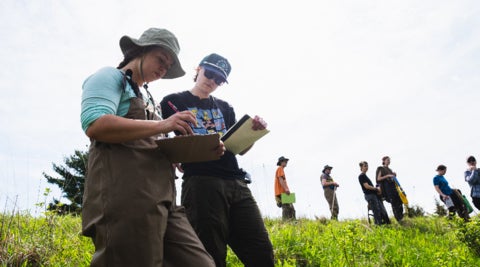Why Environment at Waterloo?
From exploring the impact of climate change in the Arctic to working on greener policies to creating better housing solutions, you'll join a community of students who are already leaving their mark on the world.
Study a range of environmental and sustainability issues in a community that cares and supports each other through the thick and thin of university life.
Prepare for an exciting career. Your degree won’t be all lectures and labs, you’ll also gain hands-on experience in co-op, on field trips, and as a member of one of our many student societies.
Be part of our vision for a more sustainable future. Our interdisciplinary research and applied, experiential learning are focused on making our planet a better place for current and future generations.
Environment programs
What environmental or sustainability problems are you passionate about?
Whether it's the climate crisis, food security, corporate sustainability, fast fashion, developing greener neighbourhoods, or something else, we have a program for you. Apply to one of our eight direct-entry programs on your application.
Co-op and careers
At Waterloo, you have two great ways to study: co-op or regular. Whether you opt for co-op, where you'll alternate between study and work terms, or choose a traditional four-year program, studying from September to May with summers off, you'll leave with a world-class education from Canada's most innovative university.
Grow your network while exploring different jobs and industries
Earn $9,600 and $22,800 per work term in Canada
What kind of companies will you work for?
The types of jobs you can apply for may vary by program. Here's a sample of previous co-op employers of Environment students.
- Environment Canada
- Foreign Affairs, Trade and Development Canada
- Canadian Tire Corporation
- Labatt Breweries
- Microsoft Canada
- Earth Day Canada
- Vancouver International Airport
- World Wildlife Fund Canada
- The Government of Madagascar
- Ontario Ministry of Transportation
- Statistics Canada
- City of Toronto
- Sun Life Financial
- United Nations
Success starts at Waterloo
As home to Canada's largest faculty of environment and the world's leading co-op program, Waterloo is the only place where you can test drive up to five careers before you graduate.
*University of Waterloo Key Performance Indicators 2024
**for social science programs, which include programs within the Faculty of Environment
Field notes from the Missing Manual

Finding your place
“Being an Environment student is inspiring because I'm surrounded by individuals who constantly blow me away with their ambition, tenacity, and creativity. It's impossible to walk around campus and not bump into someone doing something really cool.”

An arctic adventure
“Nowhere else compared to what I could do at Waterloo,” says Cassandra. The only problem? “I’m a big city girl from Toronto and I didn’t think I would enjoy living here. I was so wrong.”

A map to your future
“Geomatics has a lot to offer. You can shape your future however you want. You like coding? You can get a job as software developer. Like field work? Get a job as field technician. Like working with data? Get a job as technologist or data analyst. The possibilities are endless.”
Tour the Faculty of Environment
Get a lay of the land by joining our recruitment coordinator on a walk through Environment's buildings. Check out the labs, study spaces, lecture halls, and lounges that will soon be your new stomping grounds.
Life as an Environment student
From student societies and social clubs to alumni meet-and-greets and trivia nights with your professors, there's no shortage of fun to be had in Environment.
Ready to learn more?

Request a brochure
Want to learn more about admissions, programs, student experience, co-op, and careers?

Learn how to apply
Not sure about next steps? We'll walk you through the process of applying.

Connect with us
Questions about courses, programs, requirements, or careers?
Contact our Faculty of Environment recruitment coordinator →
From the Missing Manual
Visit our Missing Manual website for tips and advice from Waterloo students and staff. Topics include

Getting involved in the Faculty of Environment
There are countless ways in which you can get involved and be a part of this impact. Here are six ways you can get involved in the Faculty of Environment community.

Navigating urban planning with community at heart
Meet Hafeez, a Planning student in the Faculty of Environment and a passionate advocate for road safety, better transit, and complete communities.

Exploring local ecosystems in ENVS 200: Field Ecology
Whether identifying birds around campus, collecting invertebrates from Laurel Creek, or taking a trip to other ecosystems in the region, ENVS 200 students are always knee-deep in something interesting!


